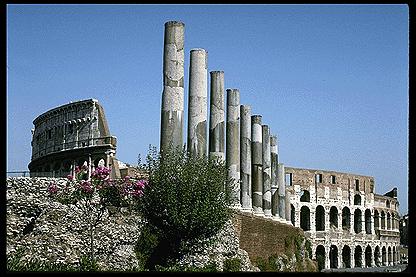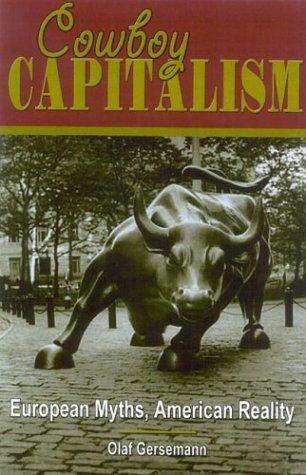
A View Not Available in North America
I do like elements of the quality of life in Europe, but little of my affection has to do with “higher living standards.” The available evidence is that in terms of material wealth (the “spiritual” kind is rather harder to measure), on average Americans are notably richer than Europeans. Air conditioning is nearly impossible to find (I well remember spending the miserably hot summer of 1995 in Paris without it), people tend to have less living space, etc., etc. Much of that is documented in Olaf Gersemann’s careful work Cowboy Capitalism: European Myths, American Reality, which I was citing…in the statement that was quoted in the Washington Post in this letter, by Lowell Rudorfer: “According to Tom G. Palmer of the Cato Institute, ‘Two-thirds of Americans who lose their jobs find new ones in less than three months, whereas two-thirds of unemployed Germans take longer than six months and nearly half take over a year to find new jobs.'”

A Sophisticated Work Comparing European and American
Conditions: It’s Also a Great Read and an Excellent Intro to
Contemporary Economic Analysis
Italy is a wonderful place; imagine how much better it would be if the Italians were richer.










Europeans certainly have less per capita wealth and income — they’d likely argue that they do have higher living standards though.
Better cafes & restaurants, higher quality of food & drink, these are obvious. Much more leisure (at least in western Europe) is also obvious. A great deal of American culture seems quite fast, cheap, & plastic in comparison. In short, quality can substitute for quantity.
I doubt that Europeans are any richer spiritually, whatever that might mean. And I suppose that when Italians et al do become richer, they’ll become more Americanized in lifestyle…since quantity can in turn substitute for quality.
I don’t know where Charles has been eating, but America has some of the finest restaurants in the world, many headed by European-trained chefs who find they can become richer serving Americans. Obviously, Europe has excellent restaurants as well, but I’ve never seen statistics to suggest that overall food and drink are of higher quality there. Certainly, it IS true that more Americans, as a percentage, can AFFORD better food and drink than can Europeans…
RL
There may be fewer really bad restaurants in some parts of Europe than in most parts of the US. For example, it is downright difficult to get a bad meal in Rome; it can be done, but you’ve got to try hard. I know of no US city where that’s true. Even in NYC or San Francisco, though it takes little effort to get an excellent meal, it also takes little effort to get a bad one.
But this is an awfully poor reason to prefer Italy to the US, especially since my idea, or the median foodie’s idea, of what a bad meal is may well not be shared by all.
I have to admit that I do much prefer most big European cities to most American ones. The only American cities that I find really congenial are New York and San Francisco, and that’s partly because they’re more like European cities than most American cities. Cities in Europe are, to my my taste, more livable. You can stroll, linger, and enjoy the conglomerations of humanity without having to get in a car and drive. And, yes, the food in Rome is generally better on average, as is the wine selection.
One reason that European cities are often so much more congenial is that they emerged spontaneously and did not suffer as much from the mania for planning that affected so many American cities, with living areas separated from commercial and industrial areas, each in its own little box. Mixed uses tend to make for more interesting places.
John Derbyshire in NRO’s Corner disagrees today:
“ROMAN HOLIDAY [John Derbyshire]
Rome — what a horrible place! Dirty and ill-kempt, the food lousy, the subway filthy, hot and slow, the antiquities in sorry shape and without anything in the way of location guides or descriptive plaques (try finding the Temple of Cybele), the heat insufferable. The few locals who have not decamped for the month of August are nice enough, but the place is addled with pickpockets from Eastern Europe and North Africa. We actually had a bag stolen our first hour in the city — nothing critical, just some clothes and a camcorder. The camcorder had a tape in it with my son’s last music recital on it, that’s the only thing I’ll miss. The police displayed wellnigh uncontrollable lack of interest. I hate Rome.
Tomorrow to the Borghese & Vatican City. I may feel better then. I have never actually seen the Bernini Apollo/Daphne. If it’s half as lovely as thye reproductions, it will make up for losing Danny’s piano recital.
Danny, who is immensely knowledgable about antiquity as a result of having played the Age of Empires computer game, was tickled pink to see “SPQR” on the manhole covers.
Posted at 08:45 PM”
Ross is indeed correct that America has some of the finest restaurants in the world. But on average (according to data carefully collected by me!) the quality of cuisine is higher in Europe, particularly in France. But this applies to the poorer parts of Europe as well. E.g. contrast a U.S. greasy-spoon diner (or far worse, a Denny’s) with a typical low-end Ukrainian stolovaya. Ukraine wins hands down.
Additionally, it is easier to find extremely high quality produce in markets in Europe; e.g. in Kyiv Ukraine, or Moscow Russia (as opposed to, say, NYC in the U.S.) (Sure, you’re limited to whatever’s in season.)
Even when I traveled in the backcountry og Liberia (pre-war) I found that the restaurants, when I could find them, were better on average than in the U.S.
Haha…this is quite a coincidence. I just discovered your blog, and I’m a freshman at your alma mater. ‘Twas meant to be 😉